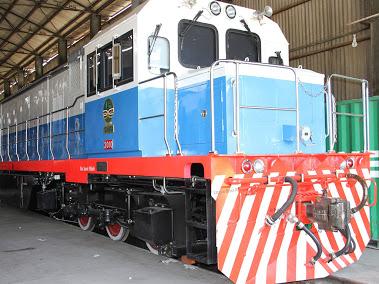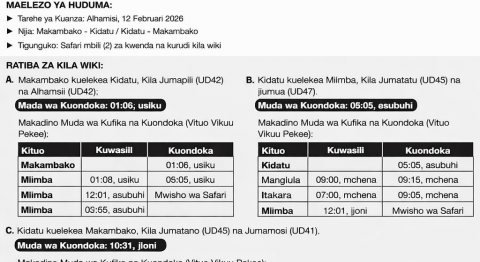
We, the Tanzania-Zambia Railway Authority (TAZARA) Board of Directors, comprising the Permanent Secretaries responsible for Transport in Tanzania and Zambia, as Chairperson and Co-Chairperson, respectively, together with three other Board members from both countries, meeting in Dar es Salaam, Tanzania, this 25th Day of November 2016, do hereby declare as follows.
The Board noted from the Management’s Report of the First Quarter of the 2016/2017 Financial Year, commencing on 1st July 2016 and ending on 30th September 2016, that the Authority had continued posting improvements in both freight and passenger traffic.
The Board noted Management’s report that the Authority had transported 29,061 metric tonnes of freight, being an improvement of 9.4% compared to the corresponding First Quarter of 2015/2016 when 26,571 metric tonnes were transported.
The Board observed that the performance of the interstate passenger trains between Dar es Salaam and New Kapiri-Mposhi improved by 20.2%, having transported 133,863 passengers during the First Quarter of 2016/2017 compared to 111,335 passengers during the First Quarter of 2015/2016.
Between Makambako and Kidatu in Tanzania, the Udzungwa shuttle train conveyed 78,246 passengers, 58% above the First Quarter target of 49,500 passengers, compared to the 66,522 mark achieved in the corresponding First Quarter of 2015/2016 Financial Year.
The Dar es Salaam Commuter Train, on the other hand, moved 751,693 passengers compared to 513,899 passengers in the corresponding First Quarter of 2015/2016. The Commuter Train’s performance for this quarter of 2015/2016 was 46% above the set target.
The Board commended Management for recording operational surpluses on both the Udzungwa Shuttle and Dar es Salaam Commuter Trains, following the outsourcing of cabin services from the private sector.
The Management reported improvements in most operational indices in freight operations, including overall enhanced and consistent security and safety in train operations as well as an average transit time of 6.3 days and a wagon turn-round time of 24 days between Dar es Salaam and New Kapiri-Mposhi.
The improvements recorded during the period under review were mostly attributed to continued interventions by the two-shareholding Governments through the provision of working capital support, which facilitated an enabling business environment and stability in operations.
However, much as the Management reported appreciable strides in restoring positive performance indices, the Board also noted that there were still some operational challenges emanating from tax-related issues at the Port of Dar es Salaam.
The Board noted, nevertheless, that the relevant Authorities were in the process of studying and streamlining some policies with a view to eliminating the perceived bottlenecks and improving the business environment in both countries.




